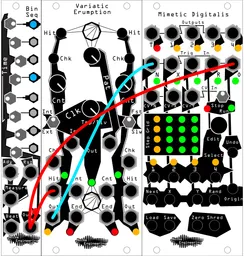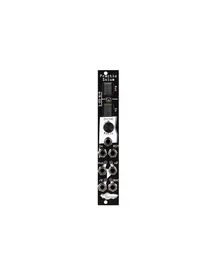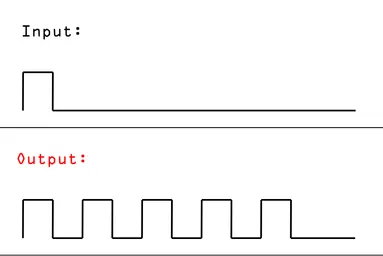Burst generators: they’re just so much fun, aren’t they? They’re a great way to spice up a sequence or create completely new rhythms. But what if you don’t have a burst generator in your system? No problem! Today, we’re going to look at a simple technique to patch one from scratch with just a few modules. Let’s go!
Wait, what’s a burst generator?
If you’re not familiar, a burst generator is a sequencing utility module that takes in one trigger and spits out a trigger pattern. The most simple form of burst generator will have a trigger input, a trigger output, and count and speed controls that set how many triggers are output and at what rate when a trigger is received at the input. Some, like our long-discontinued Variatic Erumption take that concept a bit further, giving you additional controls like selectable trigger patterns and additional control inputs for clock rate and choke. They all follow the same base concept, though: trigger in, bunch of triggers out.

How do we patch a burst generator from scratch?
If you don’t have a dedicated burst generator in your system (or, like me, you just always need more bursts!), we can really easily patch one together. All we need is a clock (or LFO), a DC-coupled VCA, and a decay envelope. Patch your clock/LFO into the audio input of the VCA, the decay envelope into the CV input of the VCA, and voila, you’ve got a burst generator. Trigger the envelope to create your burst! The length of the decay envelope controls how many triggers are in your burst, the clock/LFO controls the rate. Easy!

Let’s take a listen to what we can do with this simple patch in a sequence. Here, we’re using Pons Asinorum as our envelope generator, with our main clock as the VCA’s input so our bursts are in time with the rest of our patch. Since Pons Asinorum is voltage controllable, we can sequence the number of triggers in our bursts, too.
Taking things even further
What else can we do with a patch like this? The whole idea for this patch came by way of an email from our friend Arthur Hnatek. He wanted to trigger a whole sequence from a single hit on his extremely cool drum-controlled modular system. I suggested the patch above. But because Arthur wanted more than just sequenced bursts, we swapped in a trigger sequencer as the input, and used that to advance a pitch sequencer as well as to trigger a voice. That would mean that from a single trigger, a complete trigger and CV sequence would be generated, giving some really interesting performance possibilities.
Let’s give that a shot, too: here, instead of using a clock as the VCA input, we’re using Bin Seq, and we’re feeding it into Mimetic Digitalis’s N input so we get a four-part CV sequence to modulate our voice, as well as a trigger pattern. Along with triggering our decay envelope, our input trigger is multed to the BS’s Measure input, and the MD’s Origin input so that we get the same pattern each time our burst is generated.





